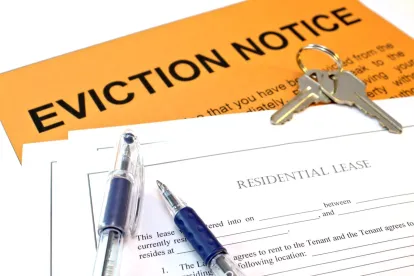In an attempt to mitigate the devastating effects of being evicted, BYU Law, the University of Arizona James E. Rogers College of Law and SixFifty, a subsidiary of the law firm Wilson Sonsini, created Hello Landlord, a bilingual web-based tool designed to facilitate communication between tenants and landlords. Hello Landlord is the result of a semester-long collaboration between BYU’s LawX Legal Design Lab and University of Arizona Law’s Innovation for Justice program. The Innovation for Justice program challenges law students to think critically about the power of the law and technology, and encouraging students to be disruptive problem-solvers in the changing world of legal services. After time spent studying the issue and problem of eviction, the students helped develop Hello Landlord as a creative, practical solution to landlord-tenant communication problems which ideally will avoid traditional legal mechanisms, such as going to court.
The Problem of Eviction: Law Students Study the Issue from All Angles
In order to create this tool, the students in the BYU Law Design Lab and the Innovation for Justice Program studied evictions from a variety of angles, questioning the assumptions commonly made and interviewing a broad spectrum of individuals involved in the process in order to understand the issue. To do this, the students took their diverse perspective to the problem, observing over 200 eviction court proceedings and speaking with landlords, tenants, social services providers, attorneys, and journalists. The broad net cast by the students enabled them to see the multiple facets of the issue and identify a proactive solution--facilitating communication between landlord and tenant to cut off the eviction procedure before it begins. Because once the eviction process starts, it’s unlikely to stop.
The findings related to the landlords were surprising. Kimball Dean Parker, the President of SixFifty, the technology subsidiary of Wilson Sonsini Goodrich & Rosati, and director of LawX, said, “I came in very skeptical of landlords thinking like so many evictions and there must be some issue with landlords. And actually when we looked at it, I think the landlord's really became very sympathetic characters.” The research pointed out that landlords were open to negotiation. In fact, landlords hated filing for evictions; it was unpleasant and it weighed on the landlords psychologically. Parker said, “One landlord cried on the phone to us talking about the emotional toll of filing an eviction . . . so landlords don't want to do this and actually will work a lot with a tenant to avoid filing an eviction.”
Evictions can be incredibly damaging with consequences that create a ripple effect. According to EvictionLab.org, beyond the obvious of eviction causing a family to lose their home, it also involves losing possessions, children changing schools and loss of community, and a court record--making it more difficult to find housing as many landlords do a search for past evictions. Evictions can impact employment, with the strain leading to more mistakes on the job, and eviction can impact mental health, leading to higher rates of depression, for example. In short, if landlords and tenants can reach some kind of agreement--even if it involves the tenant leaving voluntarily--the situation would be better for everyone.
Hello Landlord: An Automated Tool to Encourage Communication and Designed to Avoid Eviction Proceedings
The issue, according to Parker is simple: tenants don’t know what to say to their landlord and when faced with the inability to pay the rent, often the first impulse is to duck, hide and avoid the problem. The situation is made more complicated because of embarrassment and shame and the “official” nature of the contractual rental relationship. Parker says, “A lot of tenants we talked to were like, I don't even know what I'm supposed to say to my landlord.” Enter Hello Landlord. This is a web-based tool available in both English and Spanish, asks the tenant a series of questions about their situation, helping them create a letter which addresses their issues with their landlord, from repairs that need to be taken care of to missed rent payments. By asking a series of direct questions, the tool automatically generates a letter that strikes a professional, business-like tone designed to address the tenant’s issue(s). Kimball says, “We wanted to go upstream with the issue. If we can help the tenants communicate with the landlords, the landlords want the tenant to communicate. And if the tenants do that, then the landlords will work with them.”
A tenant can use Hello Landlord to explain that an unforeseen medical expense, for example, leaves them unable to pay their rent, and the tool will ask a series of questions about how much rent the tenant can pay, and on what timeline--then constructs a letter offering the alternative schedule to the landlord. Importantly, Hello Landlord crafts the response in such a way to indicate that the tenant is proposing a solution, but is also open to discussion, creating a dialogue that will hopefully lead to a successful resolution instead of an eviction. Kimball says, “ the real work was to get the tone right in the letter. . . we really zeroed in on what a landlord wants to hear, which is like, they want an explanation that makes sense and, and that, that creates empathy for the tenant. ” In fact, Kimball relates that of the landlords surveyed, 95% indicated they would work with tenants who presented them a letter like the one generated by Hello Landlord.
Another aspect of Hello Landlord, according to Kimball is “that these letters are not jurisdiction specific. Somebody in South Carolina or somebody in Seattle could use this.” This greatly enhances its usefulness, and since it lives on the internet, it is available to all who know the URL.
During the testing process, tenants responded very positively. A lot of the tenants were so enthusiastic, and they wanted to jump right in. Kimball said, “we ended up like generating letters, in real time that they could use.” The founders were encouraged by this reaction, as it demonstrates the urgency of the problem Hello Landlord was designed to address. To more systematically test out the program, the Innovation for Justice program received grant funding from the Agnese Nelms Haury Program in Environment and Social Justice to conduct further research and implement Hello Landlord.
While further research and testing play out, anecdotally it’s hard to see the downside of this creative and practical solution. Hello Landlord is widely available, easy to use and provides an important service, making it a great opportunity for everyone involved.




 />i
/>i

